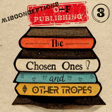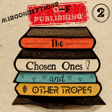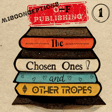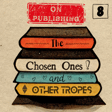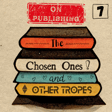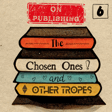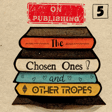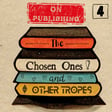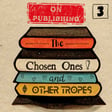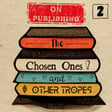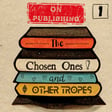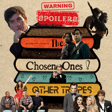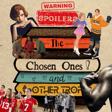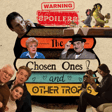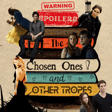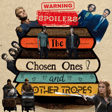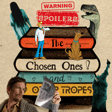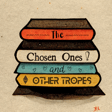Become a Creator today!Start creating today - Share your story with the world!
Start for free
00:00:00
00:00:01

S3.E4 - Crime and Mystery
This week we're onto crime and mystery tropes, so it's all detectives, law enforcement and being trapped together!
- Naomi Gibson, author of Every Line of You, Game Over Girl
- Melissa Welliver, author of The Undying Tower, My Love Life and the Apocalypse
- Jamie Greenwood, creator & host of the Write and Wrong Podcast
Transcript
Toxic Characters in Media
00:00:00
Speaker
Do you reckon Christian Grey is different characters? Whoa! You had it here first. I'm just a fiend it. After every episode was like, oh my gosh, I'm so angry at these toxic characters. Like, she'll have more food in my mouth, press next episode. Because I loved it, but obviously I hate it. This is so much fun. Because this is my Malfoy Hermione family. Yes! She shouldn't have done that. Stop trying to make Neville happen. It's too wholesome.
Season Theme Introduction
00:00:35
Speaker
Go on then Melissa, I'm giving you that shot. Am I doing it again? Okay. Yeah. You can do it. Yeah. Okay. Hello. Welcome to the chosen ones and other tropes. And this season we are talking about all of the different genres that we mentioned in
Crime and Mystery Tropes
00:00:50
Speaker
episode one. If you haven't already heard that one where we talk about what possible publishing trends there might be in 2024. We're trying to predict the future. Unlike any publisher has ever tried before. I'm sure it'll work out for us. So today we're doing crime or as I noticed when I googled it often came up as
00:00:54
Speaker
That's not enough emotional damage to light my fire
00:01:05
Speaker
also mystery tropes. Yeah, crime and mystery tropes. So who wants to kick off with the crime slash mystery trope?
Incompetent Police in Media
00:01:14
Speaker
That is their maybe favorite or maybe even if you just pick one because you thought we need to talk about this because it's crazy.
00:01:22
Speaker
like I have in previous episodes, picked the one that I dislike the most. Ah. Nice, okay. It's probably balanced at all. No, I picked my favourite romanticy trope. Yeah, that's true. I went with the incompetent police trope. Oh, yes. Very good.
00:01:42
Speaker
which is almost like a staple. When I was looking into it and I was like, yeah, this is every TV show and book ever, because obviously Sherlock Holmes, his like correspondence within the police are generally useless so that he can be shown to be the smartest man ever. And then like,
00:02:04
Speaker
all the US cop shows where it's like Castle, The Mentalist, where there's like a random outsider genius who comes in and it's like, oh, you're all useless at your jobs, but don't worry, I can solve everything in five seconds because I'm a writer. That's Castle, isn't it?
00:02:22
Speaker
Um, yeah, I just, it's kind of an annoying trope because I feel like it doesn't do any, uh, it doesn't do any justice to the hardworking men and women of the police forces who, who you would imagine at least most of them would be pretty good at their jobs. I'd hope.
00:02:43
Speaker
Whereas these shows make you think that, oh, like The Mentalist, it's like, oh, this guy who used to like do big illusion kind of shows, he can just come in and just be superior to every single person in the police department and then later on in the series, the FBI.
Outsider Genius Trope
00:03:00
Speaker
Yeah, that's so true. Jonathan Creek as well. It's very similar to The Mentalist in that response. Yeah, yeah, that made me think of Jonathan Creek. Old school, showing our age.
00:03:11
Speaker
It also made me think of, um, and this isn't strictly a crime show, but if we're doing crime mystery, this is exactly the same like pacing and stuff. And I would say in some ways it's kind of masquerading as not being a crime show, but it's, it feels like it's the same as a house, uh, house MD. And like every episode is a, basically a, something has happened and then everyone gets it wrong. And then he,
00:03:38
Speaker
like breaks into the patient's house and like finds mold under the desk or something. It's like, haha, I knew it wasn't those things all along. Here's the final clue. And it's very like Agatha Christie, like there's one piece of evidence you didn't know and I was thinking about it and I got it and I solved it.
00:03:55
Speaker
Yeah. And I kept it secret from you, which I guess works better on screen than in a book.
Audience Surrogates in Detective Stories
00:04:00
Speaker
Like if you're in the character's head and they weren't telling you something, that would be really annoying. Well, that's what, that's why Watson exists, right? In Sherlock Holmes. Yeah, he is us. Just tell me. He is us.
00:04:13
Speaker
Watson is the vessel so that Sherlock Holmes can explain everything to us. Watson is a placeholder for the reader. Insert yourself there. And then I thought this incompetent police thing feeds into another trope in this genre, and that's the misjudged dead. I don't know if that's how it's always described, but it's when
00:04:35
Speaker
um, a, a homicide or like a death is, is deemed suicide or whatever incorrectly. And there's always like this one person, the police have like, Oh, it's this case closed. And then one person's always like, I don't think it is. There's too much evidence and they like dig into it. And it's like, yeah, I didn't mind that one so much. Like it's kind of interesting, but, but again, I feel like it's a really bad look for the police who keep like getting these cases wrong. And it happens in so much stuff.
00:05:04
Speaker
You always get that one character who
00:05:08
Speaker
is so convinced of the way someone has died and they won't listen to any other viewpoint and then it turns out that they're wrong, but they're just like old and behind the times and it's just a very stereotypical character. Stuck in their ways. Yeah. I was thinking about that one with Only Murders in the Building, like the first two seasons at least, I think. The police are like, suicide or like something else. And then they're like, no,
00:05:35
Speaker
we're going to figure it out. But that works because it's kind of a comedy, it's kind of a parody of that genre. I was trying to think of like how you would subvert this and the only time I could think of a kind of close subversion to this is Knives Out.
Smart Protagonists in Crime Narratives
00:05:53
Speaker
Yeah. He's kind of, he's kind of dumb a lot of the time. Old Benoit Blanc. He's less so in the second one. I felt like in the second one, there was a desire to kind of prove how smart he was and how much of a genius he was because in the first one he was silly. I agree. Yeah, that's true. And then it felt like it doesn't...
00:06:15
Speaker
And I think we like having a smart main character because especially with the rise of like true crime stuff where it feels like, oh yeah, I'm going to work out who the murderer is on this really strange story I heard of this girl that went missing and I'm going to play detective. And I feel like they're trying to bring those characters into fiction even more than they already were doing so that we can feel like, yeah, we're smarter than the police. The police could solve this crime. Move over. I've listened to a hundred hours of true crime podcasts. I know what I'm doing. And you kind of like get into it, right? And I feel like
00:06:45
Speaker
that's what the viewer or the reader likes to see because they're kind of like putting themselves in those shoes. I suppose if someone is like really highly intelligent and they figure it out, you probably get your respect a lot quicker. Whereas if they're kind of like a bit bumbly fooling around almost accidentally discovering what happened, it's not as easy to like them. Yeah. I think you have to lean into comedy to do that, like Inspector Clouseau and stuff. I think the first nice out worked in that respect. I thought he was
00:07:15
Speaker
equally intelligent and funny. I do think it's, I do think of it as a comedy though. Yeah. Yeah. Yes. So, and it's deciding whether you want it to be comedy or crime. And of course the reason they're fun to mash up is they're really separate, right? So obviously the tropes are really separate. So you've got to decide what you're leaning into.
00:07:33
Speaker
And Knives Out very much lays itself out as like a silly thing by having Anna De Almas' character, like, she literally like throws up when she's sick. Like, she thinks... I like that. Yeah, it's great. And she thinks that she's the murderer. And like, then we know that she thinks she's the murderer and we think she's the murderer. And then like, she's with, she's literally with the detective the entire time and she's like the one person that he trusts. Yeah.
00:07:58
Speaker
It's hilarious. I mean, I love that first one, but that's what I felt was kind of missing from the second one, which was more of a kind of... A bit of a different tone. Yeah. It felt much more along the Agatha Christie kind of plot line where it was like, there were lots of suspicions and then there was a piece of information revealed pretty much three-quarters of the way through, which kind of made everything make sense. Or was it halfway through? I can't remember.
00:08:26
Speaker
Yeah. It's like, well, I'd assume halfway through it if we're plotting because that's when the midpoint happens, but it might be slightly over. I don't know. Did they read Save the Cat? Who knows? But yeah, they do have like a pivot moment, don't they, where they switch. Yeah. Yeah. And then you kind of watch a lot of the movie back with new eyes.
Scarpetta Series Critique
00:08:46
Speaker
Yeah. But I didn't like that one as much as the first one.
00:08:50
Speaker
No, that's true. I think they didn't use the, um, it's like thinking of your original trope, maybe that change of character as well, like characterization where they're trying to show him as a little bit smarter. Maybe that non subversion does affect it more than you'd think. Yeah. Cause I guess.
00:09:07
Speaker
If he was always smart in the first one, it was more of a Colombo style thing, where Colombo's energy was always that he seemed unassuming. He didn't sort of brag about how smart he was like Poirot does or Sherlock Holmes does. He was very kind of silly and he seemed a bit wayward. But then he always, at the end, he always brought it all together and absolutely nailed it. And that's kind of how I thought Benoit Blanc might be. But then
00:09:35
Speaker
Yeah, Glass Onion, they were just like, no, no, no, look how, look how smart he is. Because they literally do the game at the beginning, right? That he's, he's set up the murder mystery thing. And then Mont Blanc like solves it and immediately. Yeah. And he's like, wow, he's so smart. And I'm like, that was a bit much. I think we rushed into that a bit.
00:09:54
Speaker
Maybe that is a play though on all of these sort of what do they call them couch detectives now with the with the like making of a murderer type rise of yeah couch detectives or don't they have a play on it in yellow jackets and they call themselves like citizen detectives as if it's a real thing and it's just not a real thing there's a group of people online basically on like a reddit type forum who are trying to solve all these different crimes and they call themselves like yes I'm a citizen detective when they're talking to the police the police are obviously like what the hell are you talking about again another thing though to be fair
00:10:23
Speaker
where the police are quite stupid. They fall for the traps of the citizen detectives without giving any spoilers to anyone that hasn't seen it. Because I know it's not the season coming and I don't want to spoil. This trophy has made me think about, have you ever read any Patricia Cornwall with the Kaye Scarpetta books?
00:10:46
Speaker
No. Do you know I haven't actually? So, Scar Petta is a pathologist, so she primarily is in the morgue, right? And there must be like 20, 30k Scar Petta books out now. And I think towards
00:11:01
Speaker
the back end of the collection, you could really tell that the author didn't know how to get her out of the morgue. And so suddenly you've got this pathologist solving crimes the way a detective would, and then you've got them progressing to solving terrorism because the police are so stupid, and this pathologist who should be in a morgue cutting up bodies has uncovered this terrorist plot. And it's just like, yeah, if the police are so stupid,
00:11:32
Speaker
Why on earth would a pathologist be able to figure it out if the detective can't? It doesn't make any sense. It is very different skill set, isn't it? I think it works when they do it in iZombie. I've seen the trailers.
00:11:48
Speaker
Yeah, so the main character is a zombie. Spoilers happened to the first episode. And obviously she's like befriends the pathologists and they solve crimes because whenever
Supernatural Elements in Crime Shows
00:11:58
Speaker
she eats brains, she can see the memories of the dead person.
00:12:03
Speaker
So that like helps her solve the crimes. I think I'm remembering that correctly. She can certainly like, she has an extra ability essentially that helps her solve it. So it makes at least more sense that she is better than the police because she's pretty much psychic. I think in fact, it's points are like, oh yeah, she's a psychic, her parents are psychic. So she like points them in the right direction without being too specific.
00:12:21
Speaker
Yeah, because nobody knows that she's a zombie. Isn't that like in Warm Bodies when he eats brain cheeses? Yeah, that's like totally in Warm Bodies. And I'm not sure if that's what they do in the book either, but iZombie was a, I think it was a graphic novel. Oh, okay, right.
00:12:36
Speaker
And then was a TV show that was quite fairly popular. It was like, had like quite a cult following, but yeah, at least the trope makes sense because she does have an extra ability that makes her better than the police. Like the police, the stuff that the police could never know if she didn't find it out, if that makes sense. And at least we see it with her. So I think it works there, but that's like a supernatural ability. So.
00:12:58
Speaker
Because conversely then like Castle and like in The Mentalist and Sherlock Holmes and stuff, they're superpowers that they're just smart. Yeah. Just really observant. There's a mean implication towards the police with that. Yes. Yeah, exactly. Yeah, yeah. I can see the supernatural one more because there was a show ages ago, I think it was called Moonlight.
00:13:23
Speaker
And it was about a vampire who helped the police, but he was obviously doing stuff at night and which police wouldn't be allowed to do, so it makes sense. But then he had to find a way of secretly getting the information to the police without revealing
00:13:39
Speaker
who he was, how he did it. That's a kind of like fun way of doing this without making the police look ineffectual and also having kind of a character that justifies why that they are superior to the police. Yeah, I think that's what's important is the justification because I know we talk about toxicity in tropes quite a lot. Obviously, a lot of what we're talking about is very silly, like people eating brains to like see into people's minds and stuff, but
00:14:06
Speaker
I suppose from another standpoint, me and my mum always have this joke when we watch something that, oh yeah, well I'd never go to the police because we're all idiots. And that's obviously not
Citizen Detectives and True Crime Influence
00:14:16
Speaker
true, but it feels like it is because you watch these programs and the police and especially the FBI are always useless and they always have to get somebody else to do it. And it does start to make you like, even though it's fiction, like to help the ability of the police to do anything, which is probably a really terrible, without going too much into the politics of the police in the year of our Lord, 2024.
00:14:37
Speaker
Yeah, it makes me think, oh, I don't know. Maybe that's like a slightly toxic way that that trope goes. It does make you less. And then also, of course, this assistant detective thing, it does make you think, well, I can work it out. So I'm going to break in. I hear on podcasts all the time, people like break into crime scenes. Yeah. And I go and explore like, because they're like, yeah, I can work it out. And it's like, oh, I don't know if this is a good idea, guys. Like maybe maybe we should trust somebody.
00:15:06
Speaker
I think only murders in the building struck an okay balance with this, where the police, at least in the first season, they incorrectly closed the case. But then the police consultant, basically they have like unique information because all three of them live in the building and know things about the building.
00:15:26
Speaker
And the police, the detective in charge does reopen the case after listening to them, but they also do lots of stupid things and then the police have to, she has to come and like get them out of the, like fix the issue that they caused for themselves. And she's like, you're idiots. Stop doing that. Yeah. Yeah, exactly. Cause like, that is a good balance. Yeah. Yeah. Bit of this for that. Yeah.
00:15:50
Speaker
Yeah, but that's all I got for that. That's, uh, anyone is, uh, it's a really good one. What do you think Naomi, what was your, did you pick a favorite or at least favorite? I picked a favorite. Yeah. I went with, um, one that I personally really love and it's, uh, it's not like a character kind of thing. It's, it's called the defective detective, which I really like. Um, it's basically, you don't recognize it if you saw it, but it's basically like, if you, you have this seriously flawed hero.
00:16:20
Speaker
who is basically so messy and their personal life is like quietly or loudly going up in smoke. They probably got a vice like an addiction or like a personality disorder or something. And it's just, I love that so much when your hero is just as messy as the antagonist. So I was thinking about where that came from really.
Defective Detective Trope
00:16:46
Speaker
And I was thinking we've already touched on Sherlock Holmes,
00:16:49
Speaker
You know, he was like a heroin addict, I think, or like a morphine addict. Not in the modern versions. That's true, actually, yeah. And I believe, like, so I've only really read one and it was like in school with the hand of the basketballs, but I believe that he stopped taking drugs if he was interested enough in a case.
00:17:12
Speaker
So it was almost like he was taking drugs because he was so bored, but he was also famously cold and distant. And then you had Watson who we've already discussed is basically, you know, you're us, like insert us here. But he was like, he's the antithesis of Sherlock Holmes in every way.
00:17:35
Speaker
But also, have you guys seen Marcella or Marcella, however you say it? I've not seen it. Is it a book? I have seen it secondhand. I have not seen it. Secondhand. I watch everything over Gabby. If Gabby's watching something, I'll be watching it over her shoulder. I wouldn't say I gave it a hundred percent of my attention, but I watched it secondhand. No, I haven't seen it though. Go on, explain it to me.
00:17:57
Speaker
So she is a female detective. And in one of her series, she has this gap in her memory where she just cannot fill in what happened. And every now and again, she blacks out and she wakes to find that she's done things without remembering them. So she's basically got dissociative identity disorder. So she's grappling with this thing that's going on while she's also trying to solve a crime. And it's about these two, you know, like her personal life and her professional life are like,
00:18:26
Speaker
slowly coming together. And you really think like she's the one who did these murders because she's blacking out and it's obviously her, she's waking up covered in blood, you know, that kind of thing. And it's all about the collision of these two storylines. And it's really, really good. But I think just because I'm such a, I don't know, I love psychology and I love the way that people work. And I just think that this trope is just so interesting. It just lends itself really nicely to character.
00:18:55
Speaker
And if you look back at something like CSI, every detective on the team had something wrong with them. They were all involved in something in their personal lives. I think one was a gambling addict. One was a single mother and her daughter getting wrapped up in crimes and stuff. And Grissom, the main guy, he was
00:19:17
Speaker
like he was a really weird person that you couldn't really talk to him, I think, I don't know. And then you've got Poirot, people like Poirot who had OCD, though, you know, I know someone with OCD, and I'm not sure I really buy that he had OCD, but you know. And it's just like- The implication, yeah. Yeah, and it just makes the statement that it's not necessarily solving the crime, that's the hardest part of being a detective. And these are our heroes, and they're real people, just as messy as us,
00:19:47
Speaker
And it makes a comment as well that it takes someone dark and troubled to catch someone dark and troubled. And you usually end up comparing the protective to the serial killer and wondering if they're all that dissimilar. It's really clever the way that they set them across the table from each other at a certain point. And you're like, actually, you're both really messed up. Yeah, that's how you found each other. It's a nice way to create characters as well, I think. Yeah, for sure. Batman and the Joker, right?
00:20:16
Speaker
I was thinking this is so like Gotham code. Yeah, it's brilliant. Batman's such a good example of it, yeah.
00:20:24
Speaker
Have you guys seen the TV series of Hannibal? Yes. And Hugh Dancy. Yeah. That is, first of all, I think you would love that. No, I mean, it's so like dark and twisted. Yeah. Very a reliable narrator. You love a reliable. But like both of them, they're like, they spend so much time together and they are so like ying and yang with each other, but they're both like very disturbed in their own ways.
00:20:54
Speaker
And it very much is, he is the most effective of the detectives, I would say. Yes. Yeah. Yeah. There's like so many twists and turns, like no spoilers, obviously. Even though it's more than five years old and doesn't break my rule. I'm not going to spoil it because it's so good. I always want people to watch it. So I'm like, no spoilers. It's only three seasons as well. So it's like, and it's finished. It's like a nice complete thing. Oh, that is good. Yeah, okay.
00:21:16
Speaker
Yeah yeah that works really well in the trailer I was thinking about Hannibal was crossing my mind as well but I think it does like Naomi was saying it does fit really well if you want to I suppose when you're writing a crime and I've never written a crime novel so like I'm just talking about things I don't know about but let's pretend I do and I assume it would be it's quite the toughest thing is making the
00:21:38
Speaker
murderer or i mean it's usually a murderer but um the antagonist interesting when you've not technically met them but you have technically met them and
Character Depth in Crime Narratives
00:21:46
Speaker
then also having your hero really interesting so usually your antagonist is like your second most important character
00:21:51
Speaker
Yeah. So it must be quite tough because you don't know who they are. Like the majority of most crime surely works like that, right? Like you don't know who they are, the majority of it. So I guess if they're similar, but opposite to your hero, you can start to like guess that can help you guess a bit more. And I think with that kind of scenario, you usually have someone who is so cracker is a good example of this. He is a
00:22:11
Speaker
This is Robbie Coltrane going back a bit in the 90s. He was a really good profiler. So he would tell you what the antagonist, the serial killer, let's say, would be like. He'd be like, you know, he's white, mid-30s, lives on his own or whatever. He'd build up this picture for you because he's so clever. Yeah, that's like Hannibal. Yeah, yeah. And he would just like tell you about it and also make himself look really clever and able.
00:22:38
Speaker
Whereas actually in reality, he's a gambling addict and really overweight and an alcoholic and you know, it's interesting. Yeah. Has his own vices to deal with. Yeah, for sure. Speaks with a quirky voice, et cetera. Yeah. Also us in the UK, I think like
00:22:53
Speaker
much more so than like the U.S. crime shows in the UK. I feel like anything on BBC and ITV or Channel 4, the U.S. detective series, they are all so like, they're all wrecks. They all have like so much. Like, Luther is a classic one. They're all like, they will have terrible lives. Everything is like gone for them. They've all had serious trauma. And then they're out there on the front lines like,
00:23:20
Speaker
making mistakes, but eventually solving the crime, you know? Yeah. We've lifted that from Nordic noir, right? Yeah. Oh yeah, I think so. Cross the North Sea.
00:23:32
Speaker
It's making me think about hot fuzz and Simon Pegg in that because he's perfect. He's the perfect detective. He has two ears really good at his job. Is that the problem? Private life issues apart from the fact that he's lonely and I think that's really clever.
00:23:50
Speaker
the fact that they almost subvert that trope. Like, no, he's perfect. He's just a little bit lonely. Yeah, he needs a bird. Don't they ship him off because he's making everyone look bad? Yeah, that's it. He's so good. Literally, his character arc is to stop being so good at his job. That's his character arc.
00:24:09
Speaker
That's so good. We just talked about yellow jackets and it's not strictly like a mystery crime, but especially you talk about citizen detectives and Christina Richie's character in this is very part of that online detectives thing.
00:24:25
Speaker
But they all, that whole, the whole thing is a mystery. Like they are constantly kind of trying to solve a mystery of like whatever's happening, depending on, it's different on season one and two. But yeah, I mean, they, they've, the whole premise of the show, if you've seen a trailer for it, you know, and it's, it's Lord of the Flies, but with a girl's
00:24:45
Speaker
Football team. Is it basketball? Football. Soccer. So they will come back with incredible trauma and emotional baggage from that, which I guess is literally, they're not strictly detectives, but it's close
Crime vs. Mystery Genres
00:25:00
Speaker
enough.
00:25:00
Speaker
Yeah, that's true actually and that does create interesting characters and again like unreliable narrators as they're sort of like the show is like on one hand this particular thing but it's obviously about all of them like burying their grief which is very similar to like the defective detective character. So I think it does fit in the genre still. I think as a lot of the tropes of the genre and the hallmarks of crime mystery
00:25:23
Speaker
As I say, it seemed interchangeable when I was Googling and having a look for which trope I wanted to use. Like, crime and mystery on Google were interchangeable. They were using it as the same word.
00:25:33
Speaker
I guess the only difference would be that crime specifically will usually involve law enforcement. Yes. Whereas mystery doesn't necessarily have to. Yellow jackets is more mystery. Yeah. At times there's law enforcement involved, but that's not the main thing. It's not a police procedural. Yeah. None of the characters work for the police. I don't know. You never know season three.
00:25:57
Speaker
Who knows? That show is wild. The only other thing I was interested with this was does the defective detective, I don't think it's required, but I think it's very common with body cop stuff where there's usually one, like the pairing usually doesn't work because one of them will be young, kind of excited, enthusiastic, and then the other will be
00:26:25
Speaker
they're like classic lethal weapon like, I'm too old for this. One day from retirement. Exactly. I feel like that's, I think the defective detective works really well in that situation. Cause you have the one person who like has the, you know, whatever they've gone through or what they've got to this point and they're like done and they're sick with the job and done and want to be out of here. And then you contrast them with the opposite, which it's kind of like Sherlock Holmes and Watson sometimes, but
00:26:55
Speaker
a bit more kind of comedy orientated. Yeah. I think it's tough to say Watson is like sort of, I guess technically maybe more of a sunshine character because obviously it wasn't, isn't he, am I right? I'm thinking he was in the war and he's a doctor and he was injured in the war. Is that part of the Sherlock universe? Yeah. He's also defective. They're both defective. I suppose that makes them a little bit more three-dimensional.
00:27:23
Speaker
Yes. Oh yeah, it definitely does. Yeah, then just like literally the like, what do they call it? A mouthpiece for the audience. Yeah, yeah. Just to be like, tell us Sherlock, tell us the answer. Yeah, isn't that like the magical friend like in Harry Potter, you've got Ron who will explain things in layman's terms to you. Oh, explain magical things. Yeah, yeah. So sometimes feels like Watson's job is to sort of explain what Sherlock's talking about.
00:27:48
Speaker
A hundred percent. I think that's why the character exists. It's also, I mean, if you look at the different incarnations of the like recent adaptations to television and stuff, Sherlock is like an unrelatable character. So they always cast someone very like friendly and kind of much warmer. So you've got like Martin Freeman with Benedict Cumberbatch, Jude Law with Robert Downey Jr., Lucy Liu in the one that was set in New York.
00:28:16
Speaker
They humanize Sherlock just by being in the vicinity of... Because Sherlock is hard to relate to. Yeah. Yeah, on purpose, obviously. Because he's unrealistically... Yeah, he's a savant. Yeah, exactly. That's the word. Especially the Benedict Cumberbatch one.
00:28:37
Speaker
Yes, yeah, yeah, that's sort of the whole, this whole thing, isn't it? And then if you have somebody that you can't, I suppose with this trope, like a lot of the detectives are quote unquote, unrelatable, but then also, I guess, because they have a very sad backstory a lot of the time, I think that's the thing that pulls you in emotionally, right? The emotional hook is like, it's usually, so what is it in a broad church, as I was trying to think of?
00:29:00
Speaker
And David Tennant's character, I seem to remember there was a really sad backstory with his daughter and his wife. And then also he has a brain tumor and it's like, just pile it on. It's a lot else could go wrong. But that does make you like connect with him or even when he's being mean to Olivia Colman's character. You look a bit difficult.
00:29:17
Speaker
Yeah. That's another thing about it. I guess they, well, I was thinking, the shows that I've watched from the US, they're like procedural ones. Castle, he is living his best life when he starts helping the police. He's literally like best-selling author, king of the world.
00:29:36
Speaker
The opening, I think if I remember correctly, the opening episode where you first meet Castle, he's having like a penthouse party book launch for his latest novel. Just like I did. The other show I watched of those ones from the US is The Mentalist. Now I realize he does have an extremely tragic backstory and the reason he joins the police is because the serial killer
00:30:05
Speaker
that he's after murdered his family. Because he used to do shows where he fake read people's minds and stuff, because he is a mentalist. And he did one where he kind of poked fun at this serial killer, and then the serial killer killed his wife and child. And then he quit everything and wanted to start helping the police so that he could find the serial killer.
00:30:31
Speaker
Yeah, they always have to be a load. But it's funny guys. It's really funny. It's really fun. It is actually really fun. It's a great show, but it's one of those shows that this is such an aside. It should, there's clearly a point where the writers had intended it to finish. Right.
00:30:53
Speaker
And it has this incredible point where I've been like, God, if you'd finished it here, this would have been one of the all timers. But then, um, it was doing very well. So they made like three more seasons.
00:31:04
Speaker
Yes. I think at one point, I forgot his name, the guy that plays Patrick Jay in the main character. At one point, I think he was the highest paid TV actor in the world. Wow. Nice. Yeah. That's crazy. Presumably that was before Modern Family hit its apex. Anything else about this trope or? No, it's a cool trope. I was going to say, defective detective. It is a good one.
00:31:29
Speaker
I had to learn a lot for this because I've not really looked too much into the tropes for crime and mystery because it's not something that I've ever tried to write or have read extensively. I tend to read the, I like stuff where you follow like the con artists or the people doing the heist. Okay, yeah. I'm a criminal aha. Which, yeah, it's not the same.
00:31:59
Speaker
the other side too. Yeah, I think it's interesting you guys both picked a trope to do with like the detective or like the police because I did not at all.
Isolation Trope in Crime Fiction
00:32:10
Speaker
I chose, I think they could just call it like the isolation trope. So this is where Agatha Christie uses it loads, I realised. Oh, okay. No drawing the Orient Express or the mousetrap.
00:32:21
Speaker
Murder on the Earth Express is easier to explain because it does what it says on the tin and you have to basically sign a death warrant if you go to the mousetrap saying you'll never tell what it's about. But the mousetrap is set in a mansion in the middle of nowhere and that's where the murder mystery happens. But it's because the film of the mousetrap
00:32:46
Speaker
is about the mousetrap. It's a bit of an inside one on the other. But a murder on the Oran Express is a bit easier because obviously it literally happens. It's a murder on the Oran Express. Spoilers. So you're trapped on a train and that's kind of the whole point. So the isolationist trope in crime specifically is where it's like a really small cast of characters and they're trapped in a space and it's like we can't leave here until we find out who the murderer is.
00:33:08
Speaker
There's also the way that most, I've done a couple of murder mystery parties and that seems to be like every murder mystery party. So when you read your little piece of paper, we can get there and say, we have all been trapped in snow, but someone's been murdered and it must be someone in this room because no one else can get here. I quite like those because I'm not a huge devourer of
00:33:30
Speaker
crime fiction and like mystery fiction and murder mystery type stuff But I do like that. I feel like I can maybe try and guess more when there's less characters. Yeah I'm not very good. I'm not Sherlock Holmes I feel like there's more chance of me trying to work out what's going on because there is this really limited cast and they don't often try and pull a random character out the bag like it's just the characters that are there that's kind of the point and
00:33:56
Speaker
Yeah. Um, so yeah, it's not like, and then it was the man living in the walls. Like that's like horror. I think no. Um, so I quite like that one. I like when they're all stuck. There's less influences in there from the outside. You're right. You can work it out yourself. And it's often it boils down to what someone said that doesn't quite line up or is maybe too telling. And you could like, you can skip back to that bit and be like, yes, I saw it coming.
00:34:18
Speaker
Yes, I like that as well, that you can totally skip back and think, oh, that's exactly where that happens. I think it lends itself well to a little bit more tension in a murder mystery, because obviously that has been a murder, obviously it's very intense. But if you've got little rest stops, whereas when you're trapped in a room, or trapped in a house, or trapped in a car, or a train car,
00:34:41
Speaker
I feel like there's more tension and I'm, I'm quite, uh, I need like quite a lot of tension and stuff I'm reading, especially. So I quite like that, you know, you're trapped in there with the murderer. So I was thinking about, um, Catherine Foxfield's books are all kind of with this trope. So all of Catherine Foxfield books are like, um, trapped room mysteries is another thing they're called. It's like, how did they get in and out maybe, or we're all trapped in a simulation and we're all going to get out before the person murdering everyone murders everyone.
00:35:08
Speaker
I guess it lends itself to horror as well. But yeah, I quite like The Isolation Trope. The Haunted House. Yeah, Haunted House is a good crossover though. I like that when you keep it in one place, you as the reader, or if it's like a show or a movie, you get very familiar with the space.
00:35:29
Speaker
As you say, it feels like it's less pressure for you to try and guess who it is because it's like, here are the characters and here's the space and here's how you can move around. And as it goes on, you get told, so this person might have been here, these people were here, this discussion happened. I think even though a lot of it's parody, I think Knives Out actually does this really well. They're not stuck there because of like any other reason other than
00:35:55
Speaker
Benoit Blanc says, okay, nobody's allowed to leave. Yeah. Which is, you know, you don't need to have a snowstorm or whatever to like coincidentally just force. They used to always do that. Like Agatha Christie, I think almost all of her stuff is like this, isn't it?
00:36:10
Speaker
She loves it. There's even a joke in, so like, obviously the mousetrap, the reason it works on stage so well is because it's all pretty, it was one house, but they all cross it across the hallway if you guys haven't seen it. And then there was that film, See How They Run, where they're talking about a murder that happens during the mousetrap. So it's like a play within a play type thing. And yeah, that's also a snowstorm. But I feel like it's almost a joke because of how often the snowstorm is used. Like they always say it's a joke. Like where did this come from?
00:36:40
Speaker
So wild. So I think sometimes it can be used as a bit of a joke and I feel like, especially in a film like Knived Out, they knew what they were doing by just saying, no, you just can't leave. I had decided. I think it happens in quite a lot of those though. The detective just arrives and right, no one can leave. Yeah. Yeah. Yeah. All the accents get locked. Yeah. It's making me think of Let's Play Murder by Cassie Lupo. So that's like a mystery and it's like a game and this character gets
00:37:09
Speaker
drawn into this game and she has to solve a mystery in the house, a murder. And there's a snowstorm outside, but I thought it was quite clever in the way that the character only gets like an hour on the bottom level before the snow will overtake, so she has to keep moving up the house while the snow follows her to solve the crime within a certain amount of time, otherwise she'll die. It's quite good.
00:37:31
Speaker
Yeah, I think that works and like it works a lot. I play a lot of escape rooms. I have a team I play escape rooms with and I always feel like it works. We've done quite a few that are crime themed and it's like a really common theme because I think people recognize this trope as a mystery thing and because obviously the nature of an escape room is to find clues and to use those clues to escape the room. Then I think it's used quite often in a crime
00:37:57
Speaker
setting where you're trapped in a small space and you've been told you've been set up as the murderer since one I've done and If you that they've gone off to get the sheriff and there'll be an hour of course exactly an hour There's a countdown on the wall and you have an hour to find the clues in the office to prove it was somebody else Break out and that's like yeah, that's quite common. Yeah, it's quite common theme and an escape room and I feel like it's using this trope Mm-hmm one thing that
00:38:26
Speaker
I think can be fun, but when you see it a lot, like if you're doing an Agatha Christie binge, you'll see this in pretty much every single one, is there's another trope that almost always happens with this is where it's like the villainous victim, where the detective has to basically go through every single person who's there, and it will usually be a cast of like 10 people or so, and they'll give you very explicit reasons why each of the people
00:38:54
Speaker
have like a motive, have like opportunity to like do the thing. So they're basically saying it could be anyone.
00:39:02
Speaker
And it can get, if you've watched a lot of it, it just gets, it's the kind of thing that gets tired very quickly. I think people, I mean, I know it's so par for the course with their genre, but for me, I'm like, it has to be done well. You know, if it's not done in an interesting way or with like fun characters, like I think knives out works well because they're all terrible people. So I don't have any reservations about being like, no, you're all the worst. Um, but with some other ones, it's like.
00:39:32
Speaker
You know, it's always going to be one of the nice ones. It's never going to be the obvious ones who were like the mean ones. And I'm like, I didn't like that. And also now I'm in my head on the kind of matter of how this genre works. And it's like, I know you're not going to subvert it because it would be boring if it was just the obvious person from the start. So I'm like, eh, you know what I mean?
00:39:54
Speaker
Yeah, I think a small cast does lend itself more to like as a plotter. Like that seems like a dream because it was a small cast and there's only one setting. You can focus really heavily on the plot and how they did it and what they did. But then also the way you were talking about it, it
Familiar Settings in Mystery Solving
00:40:09
Speaker
feels very like Cluedo coded. I feel like I just double checked. Cluedo was devised in 1943 and I was like height of all this stuff. You know, from the twenties to the sixties was all of those like classic
00:40:23
Speaker
crime novels and stuff and noir stuff coming out, wasn't it? So I was just thinking like, oh, this is very Cluedo coded. And of course, that again is like a game for you to play as a citizen detective, a bit like an escape room where you are told, OK, it's contained to this and it can only be these things. And we've devised a way that it'll be different every time. It's almost like a choose your own adventure. And then you can like decide how it works. Although I did play it at Christmas and it was not as fun as I remember. I've not played that long time.
00:40:52
Speaker
The characters are not that interesting because they're just us. I don't know why I was so obsessed with being Mrs Peacock because she's the stack of the same as Miss Scarlett.
00:41:07
Speaker
Yeah, I think there's a lot to be said about keeping people in a small space. Plays often connect with people really well because it seems like a choice for a play. It obviously is a simplicity thing because there's only so much you can do with moving sets and things. But when you watch a really interesting video, and this is a little bit of an aside, but I'll bring it back. Really good video on YouTube about why
00:41:34
Speaker
The Battle of Helm's Deep and Lord of the Rings is a superior battle to the one at the end of Endgame and the Avengers. And so much of it, stay with me, so much of it comes down to the Helm's Deep battle is built up to for like 20 minutes, half an hour or something. They get to Helm's Deep. You get to see over the course of various different scenes, the whole layout of Helm's Deep. So you know,
00:41:59
Speaker
going into that, that there is like a huge wall on one side. There's a big space behind it. There's like multiple layers on the right. There's one main gate. You're very familiar with the layout of that battle before the battle begins. And the one in Endgame, you've never seen that place before. There's no kind of markers or anything like that. It's just all because it's all clearly filmed on green screens. They just kind of added random telemetry to the whole thing. So when people move around, you have no sense of
00:42:28
Speaker
Who is where any one time and what leads into what other than you're just usually following whatever the Mcguffin is. I think it's the gauntlet or whatever. Yeah. You were just following that the whole time. Whereas in Helm's Deep, they can freely cut to anywhere in Helm's Deep or any character and you in your head, you're like, okay, well, you told me this, this was a spot earlier that I saw. I know that leg lasses up on the wall. I know that Aragorn's down where they get. It's like it cuts across and it's like, oh, I know this is the bit over there. Yeah, is it very strong please?
00:42:56
Speaker
I think that's really underestimated how powerful knowing the environment can be. And with these murder mysteries where they're set in usually a classic large mansion in the UK somewhere, it's very easy for you to be like, okay, this is the living room. I can see where the two exits are here. I know that leads into the dining room or the kitchen. It's interactive.
00:43:18
Speaker
I think if you're an avid crime reader, I think especially reading because obviously you don't have any visuals, unless of course it has a really cool map at the beginning of something. But you don't really have any visuals, you need to know the space really well. And I think it feels interactive because it is like a game you're playing with yourself to guess who the murderer is.
00:43:38
Speaker
before you're told who the murderer is right so i think you're you're totally right actually i can't believe you actually did bring that back because i was like you're totally right yeah like i think it does help if it's a smaller space it helps you to play the game better yeah because you can be more familiar with it exactly and you can understand and it feels like i think when they do it badly and they do do something where they decide oh it was this person that you didn't know that lived in the walls it feels like they cheated because it's like no i knew everything
00:44:06
Speaker
I knew everything before coming in here. You told me the layout, like, yeah, I think that does work, especially with the interactive element. When they're like, oh, and it was this person and you knew that they were in this room at this time, but what they did was they went out the window, they climbed up the gutter and came in the top and then went back down again. And you're like, oh, that makes sense. Cause I know the layout of the house. I knew that that was possible.
00:44:26
Speaker
Yes, exactly. So I do think that helps it to work, not as I say, a huge reader or watcher of crime and stuff. I don't know why I've watched so many crime plays, but apparently I have. That's my favourite theatre activity. That's your niche. Yeah, apparently that's the niche, but yeah, and it's also why it works well as a play. It adds to the interactive element, which I think people really like specifically in crime. I was going to say with this trope though,
00:44:55
Speaker
There is a trope that comes with, it doesn't necessarily have to be with this, but it often is with this, is the, I'm about to give some major spoilers, by the way. Major spoilers for Murder on the Orange Express, Bad Times at the El Royale, The Hateful Eight, and The Wrestling Game. So you've been warned if you're listening still. I hate the everybody did it trope. Oh yeah. I hate it so much. It's a little bit cheap. I saw that come up when I was researching.
00:45:25
Speaker
It just feels like such a cop out because I'm like, I've sat here and been, like we've said, I've been playing the game. You've shown me all the people it could be. You've shown me like the places where it's happened, where everyone's been, the different weapons or whatever, just like Cluedo. I'm sitting here playing like mind Cluedo with this stuff you've given me. And then you're like, nah, everyone did it.
00:45:46
Speaker
I'm like, great. You wonder when they decided that as well. When did you decide this? Did you decide this at the last minute? Or did you plot it? Did you decide at the beginning that everyone had done it? Or did you panic at the end to decide if it was nothing? It does feel like a cop-out.
00:46:04
Speaker
The only time I think it worked probably at the time when it was written was probably when Agatha Christie did it for Murder of the Orange Express. And everyone was like, everyone was expecting something else from her. So she, she, she subverted herself by doing it. But yeah, it was almost like her own little joke, wasn't it? Yeah, which she, she was such a troll like that time when she did. And then I love her. Yeah. Brilliant. Yeah. Do it. Yeah. What a diva.
00:46:34
Speaker
But that everybody did it feels like such a cop out to me. And it just, it feels like I've been cheated out of the out of what I was cheating. Yeah. Cause the promise of a mode of mystery is I get to play. Yeah. Yeah. That is true. Yeah. Yeah. It's different to every other genre in that sense. But I feel like I never had a chance. The house, the house was always going to win. Very angry. Like I don't expect to be able to guess it that I always expect there to be a piece of information left out. Yeah.
00:47:04
Speaker
At least it's nice to pretend, you know? And when they're at the end, when they're like, oh, everyone murdered him on the Orange Express. I'm like, oh, great. Fantastic. This could have been an email. It feels dated now, maybe. It feels overdone. Yeah. I don't know. It's almost like, why bother telling me about all their characters then?
00:47:28
Speaker
Yeah, that's true. And it's like, were we even ever playing a game when it was literally just 1v1 the whole time? It was the detective versus absolutely everyone else.
00:47:36
Speaker
Yeah, that's true. Wasn't really going to work, was it? Anything else? Anything else on this trope or have we? Um, no, I, I, I talked about my, my gripes. But the court of itself, I'm a huge fan. I love, I realized reading into this that I love having your kind of core cast, keeping them all in a very contained space. And from a writing perspective, there's always like,
00:48:06
Speaker
for me at release, I find it's always a challenge to be like, okay, I need to get, you know, X to Y. I need to, we need to move somewhere. We need to travel. And then it's like, do I, do I just leave it blank and just, we just arrive at the destination and I start writing or do I like need to, you know, do I put some exposition in there? Do I need to like, you know, there's, yeah, there's always a lot of logistics.
00:48:26
Speaker
Exactly. Yeah. Logistics is tricky and having them all together. And it means you only have to describe, you know, the setting kind of once or twice. And then people are like, then you're just like, oh, and then they moved into the living room and you're like, well, I know the living room. We've been here before. Yeah. No, that's so true. I never even thought about it like that. It's such a hack. Yeah. Yeah, it's great. Rise it down. Do a closed room.
00:48:51
Speaker
But this was an interesting mystery and crime. It feels like with this one, there's so many small tropes for this, for these genres. There's less like, I guess we covered, like the murder mystery isolated locations, I guess is like a core story trope, but it's, but it's not really part of the, it's more like part of the setting. Yes. So I was, I kind of just flicked through tons of different tropes with this and I was looking at loads of them. There's a few.
00:49:16
Speaker
They're so recognizable, I think, for this genre as well, even as somebody who's not a connoisseur of this genre. I feel like so many of them, I was like, yeah, I can imagine that. And lots of them as well felt familiar enough that I would probably be quite excited and interested if I saw it. It almost feels like it's supposed to be a genre built with tropes. Maybe that's why it continues to be so popular.
00:49:37
Speaker
That's what murder mystery is like. If someone says, oh yeah, we're going to watch a murder mystery. You know like three, you may not consciously think it, but it's like, that's going to be like guaranteed. There's going to be like three of the tropes we've talked about today. Yeah. Like no matter what really.
00:49:52
Speaker
Yeah, in a different way to fancy or sci-fi that might do something differently. Yeah, I do think that's why it's enduring. And there are people who if you are really into crime, there's a reason that it's, you know, case number 47 of ex detective. Yeah, like there is a reason for that, because people like that familiarity and the way of working out and playing that game.
00:50:13
Speaker
And that's why crime writers are just consistently putting out, because people have an appetite for these kinds of things and they want to just keep reading it. So crime writers are just, you know, they put out a new book every year, multiple books a year, and it's all hunky dory. Whereas like you say, sci-fi fantasy,
00:50:33
Speaker
Yeah, it's completely different. There's a reason that the digital first publishers don't really push sci-fi fantasy, but say romance and crime, very much popular and work really well in those categories, more so than they would.
00:50:44
Speaker
Because you almost don't want to subvert tropes in these genres. Yeah. Like you want something surprising, sure. But like, I think about Knives Out is allegedly like a parody. And the idea is that it's, it doesn't really subvert that many tropes. It has a bit of fun with them, but they're all still there. You know what I mean? Uh-huh. So if you subvert the tropes, it's no longer, I think this is one of those genres where if you do subvert all of the tropes, you're not, you're not writing for the genre anymore.
00:51:15
Speaker
Yes, you're maybe making it comedy or making a point. Yeah, exactly. Which is the place to make that sort of point. Yeah. It's interesting. It's like writing a straight romance, but not having a happily ever after. Like that almost puts it in like a different category. You know, that puts it in like... Yeah, people feel really strongly about that. So true. Yeah. It's like people call it like a drama at that point. They're like, oh, it's not romance anymore. It's drama because there's no happy ever after. There's no hatred. Yeah.
00:51:45
Speaker
Awesome. Good job. Thanks for putting up with our nonsense for another episode. To stay tuned to everything we're up to, you can follow the podcast on all socials at The Chosen Tropes. Follow Melissa at Melava, Naomi at Naomi G. Wright and Jamie at Jamie X. Greenwood. Don't forget to check out Naomi and Melissa's books as well as the Write in Long podcast. Thanks again and we'll see you on the next trope.
